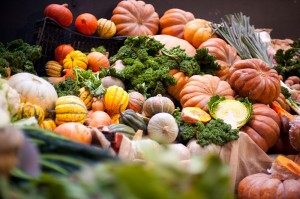
More evidence that low-calorie sweeteners are bad for your health
Studies show that artificial sweeteners can raise the risk of hypertension, metabolic syndrome, type 2 diabetes and heart disease, including stroke.

Of all the really positive dietary habits you could adopt, eating with the seasons is arguably one of the healthiest.
It’s good for you, it’s good for the environment and it’s good for the climate – and yet many of us find it hard to make this simple switch.
Those who think eating fresh, local, seasonal, organic food is too expensive take note: Globally we spend $71.6 billion each year on ready meals. Together the US, UK and Japan account for 66% of all ready meals consumed globally. Of these three the US is by far the largest market generating revenues of around $15 billion in 2009.
Among European nations, the UK consumes the majority – a depressing 46% – of all ready meals sold.
When we are not eating ready meals we are eating on the go; people in the UK are also Europe’s biggest consumers of fast food, and burgers are our favourite food on the go. UK government figures show that we spend £7.6 billion – one quarter of our total eating-out spend – on fast food, including fish and chips, pizza, burgers and Thai, Chinese and Indian takeaways.
In a ready meal culture many of us have disconnected from and become deskilled in the art and science of cooking and storing food. Schools no longer teach these skills as a matter of routine (though this is beginning to change) and as a result several generations of adults no longer understand the basics of feeding themselves.
Chilled ready meals may be convenient but they often require multiple ingredients from multiple global destinations all of which increases their carbon footprint. Food transport now accounts for 1.8% of the total annual UK carbon dioxide emissions and 8.7% of the total emissions from UK road use.
Storing these ready meals requires energy during shipment, at the supermarket and at home as well. While it is true that appliances are becoming more energy efficient, the energy needed to ship, store and cook food is running out and our food habits need to change to accommodate this. Salad vegetables in the middle of winter may become a thing of the past.
Devoting a cupboard in your kitchen instead to dried, canned and preserved staples can lower food waste and the energy used in food storage and is likely to become a bigger part of our kitchen repertoire in the future.
Shop Locally
Shopping locally has a lot going for it. Local based food systems are much more resilient. They have much shorter and therefore more secure supply chains. Locally sourced food tends to be cheaper and fresher, with more of its nutrients still intact.
Sourcing locally whether from a box scheme or a farmers’ market gives you a chance to experiment with varieties you may never have known existed, from colourful heritage tomatoes to rare breeds of beef. Because the food goes more or less directly from farm to fork there are fewer hidden road and air miles and less need for refrigeration en route.
Likewise eating seasonally is a meaningful way to begin a low impact lifestyle. Shopping locally will give you a more realistic sense of what is available and will help attune you to foods that are in season. Local producers, for instance, are more likely to be growing foods that are adapted to the soil and climate where you live and so require fewer fertilisers and pesticides.
All this adds up to a compelling argument for change. Determining how far your food has travelled is almost impossible in the supermarket. There is no labelling system to help you know and if you buy lots of ready meals you may be buying foods that have so many ingredients sourced from so many places that even the manufacturer couldn’t tell you for sure how far they’ve travelled.
The answer to this is to simplify and many people concerned about health, the environment and climate change are now considering the merits of a ‘100 mile diet’. Instead of petty calorie-counting, this new way of eating counts food miles, and aims to make the majority of your diet come from within a 100-mile radius of your home.
If you live in the UK, going local and organic is easy. Around 70% of organic food sold in the UK is grown in the UK so simply joining in with a local organic box scheme can effortlessly boost the amount of regional/UK produced food in your diet.
Shopping at a farmers’ market means you are automatically getting produce that meets the requirements of the 100 mile diet since regulations set down by FARMA (the National Farmer’s Retail and Markets Association) mean that farms must be located within 30 miles (or 100 miles for London farmer’s markets) to sell their produce at the local market.
If you are new to this kind of thinking or you are just not sure what is in season, help is at hand. The good people at Well Seasoned have a range of fantastic comprehensive and colourful charts that can help you learn all about what’s in season when. These include:
Eating seasonal, local food is a positive action anyone can take to combat climate change; a way of thinking global and acting local. Eating this way can increase your intake of local foods from as low as 15% in some people’s cases to more than 80%.
It can also effortlessly change the profile of your diet to include higher levels of fruits, vegetable and grains and lower levels of meat and dairy – all good for your health and not a single lycra-clad diet ‘expert’ in sight!

Please subscribe me to your newsletter mailing list. I have read the
privacy statement